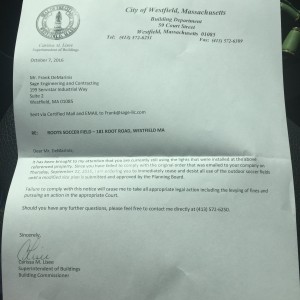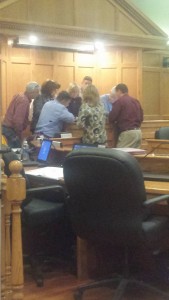WESTFIELD—The city’s planning board is finally moving on from the controversies surrounding the Roots Athletic Complex.
It was decided last night at the Westfield planning board meeting that the controversial Roots Athletic Complex located on Root Road will no longer be discussed by the board and other departments will now have to deal with any problems or concerns. And in the process, the board has decided that there will need to be some changes to how it proceeds with potentially controversial projects going forward.
“I am not happy with some of the things we decided but we shouldn’t be discussing this anymore, we should be moving on,” planning board chair Philip McEwan said last night.
The planning board has been discussing a variety of concerns with the fields since the summer of last year, when Roots first came under fire for lighting that was not OKed by the board. Then, synthetic turf was used for playing surfaces for the facility’s soccer field and crumb rubber—a substance that some residents believe can be carcinogenic—was placed under the turf, creating more concerns with the board and residents, especially considering that the facility is on top of a portion of the Barnes aquifer.
At the beginning of the meeting, Karen Mello, a resident of Westfield who also approached city council during their meeting last week, as well as the Barnes Aquifer Protection Advisory Committee (BAPAC) previously, also spoke of the perceived risks associated with the crumb rubber installation.
Mello said that through her own research she has found that the Environmental Protection Agency produced literature in late 2016 that claimed a variety of chemicals, including zinc, chromium, barium, cobalt, arsenic, copper and nickel, can leech out of the crumb rubber and into water sources.
Additionally, she voiced her concern over the use of surfactants—which can include the chemicals of concern perfluorooctanoic acid (PFOA) and perfluorooctanesulfonic acid (PFOS), as well as chemicals found in dish soaps and shampoos—in order to reduce static electricity on the synthetic fields.
“I understand that some things can be stopped and some things that I can’t do much about, but I am under the understanding that there is some installation that has not been done yet,” Mello said about the installation of the crumb rubber.

An image of a cease and desist letter obtained by The Westfield News that was sent to Sage Engineering and Contracting regarding the Roots athletic facility in Westfield (WNG File photo)
Mello’s comments also came on the heels of the board receiving a letter from BAPAC outlining their concerns with the crumb rubber.
In spite of this though, McEwan determined that it was time for the board to move on and to allow other departments to handle the enforcement of any laws and to address any issues or concerns.
“They’ve done everything we’ve required. It’s a problem between the water resources department and the applicant,” he said.
Some members of the board disagreed though, feeling that since Roots possibly violated special conditions initially established in the special permit, Roots construction can still be under the purview of the board.
“I don’t think they did everything by the book,” board member William Carellas, said. “Special condition eight says prior to installation that they will submit what type of materials will be used, not get approval, but submit what they were using and they didn’t do that.
“Then it says if rubber or synthetic material then a groundwater well will be put in a suitable location, but the applicant didn’t do that when he installed the field.”
In spite of Carellas and other board members’ protests however, McEwan maintained his position. Additionally, Jay Vinskey, principal planner for the city, said that this is now a matter of enforcement through the law and building departments, not the planning board.
“Your work is done and this is now an enforcement matter,” Vinskey said.
After further discussion, it was concluded by the board that changes should come regarding future special permits, including the vetting process when discussing controversial topics.
“May I ask the chair… that in the future with a controversial subject should we meet with [the law department] to make sure that we have teeth for this board on such topics,” William Goytette, board member, queried.
McEwan also suggested that the board reconsider the process of special permits, as to avoid issues like this in the future.
“It’s a hard lesson that we just have to learn, and we have to be more cautious the next time,” Cheryl Crowe, board member, said.


